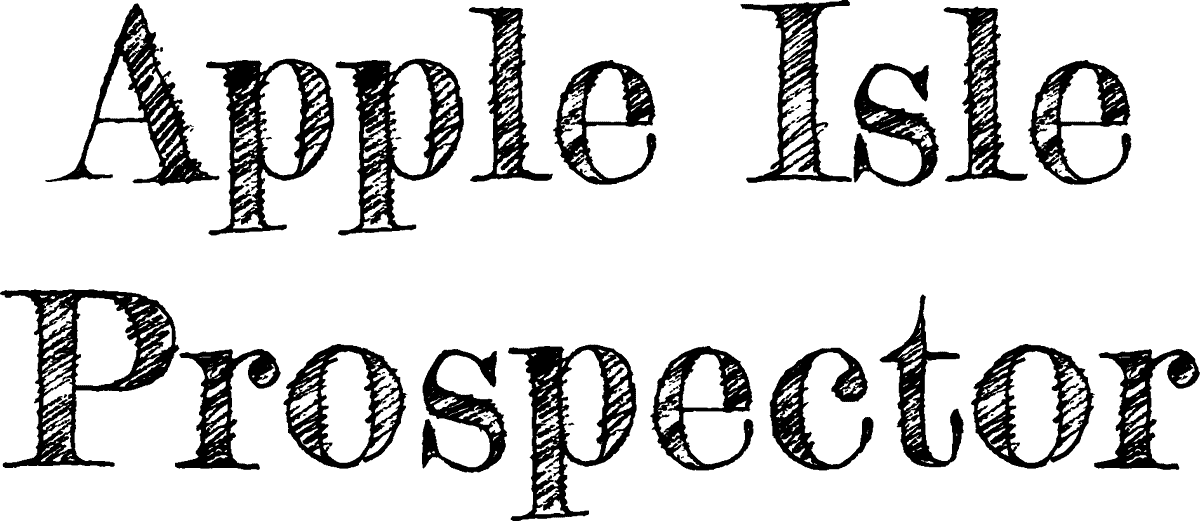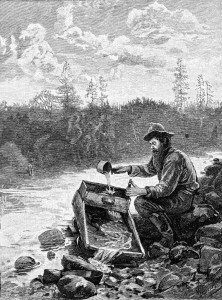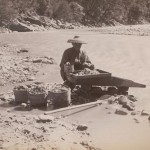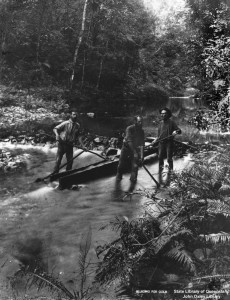This article has been superseded in part after new information from the Director of Mines. You can read the update here. I have left the original content below for informative purposes.
Many people, sometimes myself included, use the words ‘fossicking’ and ‘prospecting’ to mean the same, such as to go out and collect some rocks, or minerals, or gold, generally as a hobby. The question is: do they really mean the same thing? In short: NO, and the meaning has a bearing on what you can and cannot do. It’s up to you to know your rights. If you want to know a bit more about this, and what it means for you as a prospector or fossicker, read on.
Legal definitions of fossicking and prospecting
In Tasmania, fossicking and prospecting are both terms with clear, legally defined meanings. The Mineral Resources Development Act (MRDA) 1995, which is the main current law regulating mining and mineral exploration, as well as fossicking and prospecting, gives the following definitions (Part 1, Section 3):
- fossick means to search for minerals for a purpose other than for commercial gain to a depth of 2 metres by –
- digging by hand; or
- using hand held instruments;
- prospect means to explore for minerals to a depth of less than 2 metres below the surface of the earth or of any pre-existing excavation by means of a hand held instrument;
So if prospecting is exploring, we need to know the definition of explore, which is also found in the same section of the Act:
- explore means to determine the existence, quality and quantity of minerals for the purpose of commercial exploitation by –
- conducting geological, geophysical, geobotanical and geochemical surveys; or
- drilling; or
- taking samples for the purpose of chemical or other analysis; or
- using appropriate instruments, equipment and techniques; or
- extracting and removing from land material, mineral or other substances for sampling and testing; or
- carrying out any other activity approved for the purposes of this paragraph by the Minister;
So according to the law, the main differences between fossicking and prospecting are that you can only fossick in designated Fossicking Areas, that the primary purpose of fossicking cannot be commercial gain (in other words, fossicking is meant to be a casual, hobby occupation, and you should not be trying to make a living out of it), and that fossicking is free, but you need a prospecting licence in order to prospect, which I covered in a previous post.
On the other hand, prospecting covers a much larger range of activities, from casual fossicking outside of designated Fossicking Areas on one end of the scale, to bona-fide prospectors carrying out small-scale, mobile exploration for small, commercial deposits at the other end.
Could you sell something you find?
The current law doesn’t clearly answer the question: are you allowed to sell stuff you found while fossicking? The law says you cannot fossick with the purpose of commercial gain, but it does not clearly say that you cannot sell the occasional fossicked mineral, which many people do, for example in order to fund their hobby. It would be great to get official clarification on this, either through the rules of fossicking areas, or written in law. The safe option here would be to assume that you should not sell what you find while fossicking, or at least not rely on it for income.
However, if you’ve coughed up $30 for a 12-month prospecting licence, this gives you the ability to fossick in most public land, but also to prospect. In contrast to fossicking, the law unambiguously says that prospecting has a view to commercial exploitation. This is because, as I quoted above, to prospect is to explore (exclusively by hand), and to explore is to determine the existence of minerals with a view to commercial exploitation.
Unfortunately, it is unclear whether this means you can sell what you find during prospecting. Traditionally, prospectors looked for a minable deposit they could earn a living from, and if they found one, they would take out a claim (claims, unlike in other States, are no longer allowed in Tasmania, but that’s a subject for another post). If the deposit is large enough, a prospector would then apply for a lease. Famous Tasmanian mines discovered by prospectors this way include the Tasmania gold mine at Beaconsfield, the New Golden Gate at Mathinna, the Mt Bischoff mine in Waratah, and the Mt Lyell mine in Queenstown. This seems to still be the spirit of the current legislation, which deliberately defines prospecting as exploration, and makes it clear that it can have a view to commercial exploitation. However, neither Part 5 (Sections 107–115) of the MRDA 1995, which deals with prospecting licences, nor the rules of prospecting have anything to say about selling, or profiting from, the proceeds of prospecting itself.
While looking for minable deposits, prospectors have always traditionally often attempted to support themselves as much as possible by selling the stuff they found during their exploration. However, nowadays the current law and the rules of prospecting are unclear as to whether you can sell stuff you find or not.
Why is it so confusing?
Picture this scenario: If you’re an exploration company, and you take out a licence, and you carry out a large exploration program, perhaps including some costeaning and bulk sampling, you might end up accumulating a few ounces of gold. If you wanted to get rid of that gold, you would need to apply for permission to sell it, as that gold is still owned by the Crown. The exploration licence gives exclusive rights to look for minerals, and eventually to apply for a mining lease, but does not grant ownership of the minerals recovered during exploration. A good example of this might be the case of Alec White, who did extensive backhoe testing of alluvials at Lisle in the 1980s and in the process accumulated several ounces of gold. In a publicity display he gave the gold to the Minister for Mines as it was owned by the crown. The Minister then gave the gold back to him.
If you are a prospector, you live under different rules. However, it is still unclear whether you own the minerals you collect during prospecting or not. The convention seems to be that you do, and the Prospecting Licences page at MRT states that “A prospecting licence allows the holder to conduct fossicking activities for rock and mineral specimens outside of the declared fossicking areas”, which presumably means that any minerals you find are legally yours to keep (and do with as you wish). Even with all this considered, I could not find a clear, unambiguous statement in either the MRDA 1995, or the MRT website, that says that a prospector owns the minerals they find while prospecting. Given the wording MRT use to promote prospecting licences, it seems relatively safe to assume that if you were out there prospecting, and you found a “Hand of Faith” nugget, it would be yours to keep. If this is the case, and given that prospecting is defined as having a view to commercial exploitation, it seems safe to assume that you could sell what you find while prospecting.
Why go into all this detail in the first place?
Prospectors have traditionally always been able to sell their finds, if they so wished, and even support themselves by prospecting. I don’t think this right has been extinguished by the current laws, and I believe that the law and regulations should spell out clearly that prospectors are allowed sell their finds, if they want to, so as not to leave us in a legal limbo.
It has previously come to my attention that some of the regulatory authorities frown upon people selling stuff they’ve found while prospecting. The current law certainly doesn’t support this view, or say anywhere that this is not allowed. However, the law is clear that fossickers are not allowed any commercial gain.
UPDATE: The penalties for different offences under the mining act have just gone up last week (27 May 2015). This makes the fine for prospecting without a licence $15,400, the same for exploring without a licence, and a whopping $77,000 for mining without a lease.
Please keep in mind that the discussion I’ve provided is my own, personal interpretation of the law as it stands in June 2015. All this is just my opinion, and if you’re pondering any similar questions yourself, the best thing to do is read the legislation and develop your own opinion. If you ask the regulating authorities for clarification, and you don’t think the answer you’re getting is the full story, I would encourage you to do your own research, and learn your rights.
Do you have an opinion about my interpretation? Perhaps you have questions about the rules of fossicking or prospecting? If you like the content at Apple Isle Prospector, feel free to get in contact, or leave a comment.

![By Tony Oliver from Denver, CO, USA (Prospector) [CC BY 2.0 (http://creativecommons.org/licenses/by/2.0)], via Wikimedia Commons](https://www.appleisleprospector.com/wp-content/uploads/2015/05/449px-Gold_prospector.jpg)


